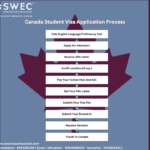Table of Contents
Graduating from a Canadian institution is an incredible milestone, but what comes next? Many international students choose to extend their stay in Canada to explore new opportunities, gain valuable work experience, or even start their journey toward permanent residency. Planning your post-graduation pathway is crucial for maximizing the benefits of studying in Canada. In this guide, we’ll explore the available options, with insights into the Post-Graduation Work Permit (PGWP) and other pathways. We’ll also highlight how expert consultants like SWEC Visa can simplify the process, ensuring a seamless transition into this exciting new phase.
Why Extend Your Stay In Canada?
Extending your stay in Canada after graduation offers numerous advantages, making it a popular choice for many international students:
1. Opportunities for Canadian Work Experience
The Canadian job market values individuals with local work experience. Staying in Canada allows you to work in your field of study, enhance your skills, and improve your employability for future roles, whether in Canada or abroad.
2. Pathways to Permanent Residency (PR)
Canada provides several immigration programs for skilled individuals. Gaining Canadian work experience, especially through a Post-Graduation Work Permit (PGWP), can help you qualify for programs like the Canadian Experience Class (CEC) under the Express Entry System or various Provincial Nominee Programs (PNPs).
3. Further Education or Career Growth
If you want to expand your academic credentials, Canada offers top-tier postgraduate and specialized programs. Alternatively, entering the workforce can help you build a professional network, laying the foundation for long-term success in Canada.
Understanding The Post-Graduation Work Permit (PGWP)
One of the most sought-after options for staying in Canada is the Post-Graduation Work Permit (PGWP). This permit enables international graduates to work in Canada after completing their studies.
1. Eligibility Criteria for PGWP
To be eligible for a PGWP, you must:
- Graduate from a Designated Learning Institution (DLI).
- Have completed a study program that was at least eight months long.
- Hold a valid study permit at the time of application.
2. Graduation from a Designated Learning Institution (DLI)
Not all Canadian institutions are eligible for PGWP issuance. Ensure that your institution is listed as a DLI and that your program qualifies under its terms.
3. Program Duration Requirements
The length of your PGWP depends on the duration of your study program:
- Programs less than 8 months: Not eligible for PGWP.
- Programs between 8 months and 2 years: PGWP duration matches the program length.
- Programs of 2 years or more: Eligible for a 3-year PGWP.
4. Application Timeline and Process
Applying for a PGWP requires careful planning:
- When to Apply: You must apply within 180 days (6 months) of receiving your final marks or a Letter of Completion.
- Documents Required: Include proof of graduation (degree, diploma, or certificate), transcripts, and a valid passport.
- Application Process: Submit your application online through the IRCC portal, pay the required fees (currently CAD $255), and wait for processing.
5. Benefits of Holding a PGWP
The PGWP is more than just a work permit:
- It allows you to work anywhere in Canada and switch employers without additional permits.
- PGWP holders gain invaluable Canadian work experience, a key factor in qualifying for PR programs.
- It offers a stepping stone to long-term residency through options like Express Entry or PNPs.
Other Visa Options For Staying In Canada
Temporary Resident Visa (TRV)
If you need to stay in Canada for a short period, applying for a Temporary Resident Visa (TRV) is a suitable option.
- Purpose: Allows you to remain in Canada as a visitor for short-term purposes, such as exploring career options or attending additional programs.
- Eligibility: Applicants must demonstrate financial ability to support their stay and intentions to leave Canada at the end of the visa period.
Study Permit Extension
Pursuing further studies? Extending your study permit is an ideal choice.
- Eligibility: You must already hold a valid study permit and be enrolled in a recognized Designated Learning Institution (DLI).
- Benefits: Extending your permit allows you to explore advanced or specialized programs, enhancing your qualifications.
Work Permits
Employer-Specific Work Permits
- Purpose: For individuals with a job offer from a Canadian employer.
- Requirements: A valid job offer and, in some cases, a Labour Market Impact Assessment (LMIA) from the employer.
Open Work Permits
- Purpose: Provides flexibility to work with any Canadian employer.
- Eligibility: Commonly available to spouses or common-law partners of international students or PGWP holders.
- Benefits: Offers freedom to explore multiple career opportunities.
Permanent Residency (PR) Pathways
Canada offers various immigration programs for those seeking permanent residency:
Canadian Experience Class (CEC)
- Part of the Express Entry System, the CEC is ideal for individuals with Canadian work experience.
- Eligibility: At least 1 year of skilled work experience in Canada and language proficiency in English or French.
Provincial Nominee Programs (PNPs)
- Purpose: Allows provinces and territories to nominate individuals for PR based on their skills and work experience.
- Eligibility: Varies by province; many programs favor graduates and skilled workers.
Steps To Extend Your Stay In Canada
1. Assess Your Goals
Define your objectives:
- Do you want to work, study further, or apply for permanent residency?
- Understanding your priorities helps you select the appropriate pathway.
2. Research and Choose the Right Program or Visa
- Explore your options thoroughly to ensure alignment with your goals.
- For example, a PGWP is ideal for gaining work experience, while PNPs are better suited for PR aspirants.
3. Prepare Documentation
Proper documentation is crucial for a successful application:
- Work Permits: Job offers, employer letters, and LMIA if applicable.
- Study Permit Extensions: Transcripts, proof of enrollment, and financial statements.
- PR Pathways: Language test results, work experience proof, and educational credentials.
4. Apply for the Selected Permit or Program
- Follow the submission guidelines on the IRCC portal.
- Pay the required application fees.
- Track your application to ensure timely processing.
5. Update IRCC About Your Status
- Notify IRCC of any changes, such as program completion or transition from study to work.
- Updating your status ensures compliance with Canadian immigration regulations.
6. Plan Finances
- Budget for application fees, living expenses, and unforeseen costs.
- If required, explore scholarships, part-time jobs, or education loans.
Key Considerations For Extending Your Stay
1. Timely Applications
- Ensure your current visa or permit does not expire before applying for an extension.
- Submit applications early to avoid gaps in your legal status.
2. Maintaining Legal Status
- Avoid unauthorized work or overstaying your visa, as this can jeopardize future applications.
3. Work or Study Restrictions
- Understand the limitations associated with your new permit or visa. For instance, certain work permits may restrict employer choices.
4. Continuous Study or Employment
- To qualify for PR programs, you may need to demonstrate consistent study or work history.
Common Challenges And Solutions
Challenge 1: Delayed Permit Processing
One of the most frequent issues students face is the long processing time for permits and visas.
- Why It Happens: High application volumes or incomplete documentation can delay the process.
- Solution:
- Apply Early: Start the application process as soon as you are eligible.
- Track Applications: Regularly check your application status on the IRCC website.
- Prepare for Delays: Have a backup plan, such as a temporary visa, in case of processing lags.
Challenge 2: Ineligibility for PGWP
Not all graduates meet the eligibility criteria for a Post-Graduation Work Permit (PGWP).
- Why It Happens:
- Graduated from a non-Designated Learning Institution (DLI).
- Study program duration was too short to qualify.
- Solution:
- Explore Alternatives:
- Apply for employer-specific or open work permits.
- Enroll in further studies at a DLI to qualify for a PGWP in the future.
- Seek Expert Advice: SWEC Visa can evaluate your situation and recommend suitable alternatives.
- Explore Alternatives:
Challenge 3: Financial Constraints
Managing finances during the transition period can be a significant challenge.
- Why It Happens:
- Limited funds for living expenses or application fees.
- Insufficient financial planning.
- Solution:
- Part-Time Work: Leverage your study or open work permit to earn income.
- Scholarships: Apply for academic or need-based scholarships.
- Employer Support: Negotiate with potential employers for financial assistance or relocation packages.
Challenge 4: Lack of Clarity on Immigration Rules
Immigration regulations can be complex and subject to frequent updates, leading to confusion among applicants.
- Why It Happens:
- Insufficient research or access to outdated information.
- Solution:
- Stay Updated: Regularly visit the IRCC website or subscribe to updates.
- Consult Experts: Work with experienced consultants like SWEC Visa to navigate the complexities with ease.
How SWEC Visa Can Help
Navigating the process of extending your stay in Canada becomes seamless with the assistance of an expert consultant like SWEC Visa.
Comprehensive Support
- Personalized Solutions: Tailored advice to identify the best visa or program for your unique goals.
- Document Preparation: Assistance in organizing and submitting error-free applications.
- Eligibility Guidance: Help in meeting criteria for PGWP, PR pathways, and other permits.
- Policy Updates: Continuous updates on immigration rules to ensure compliance.
Streamlining the Process
- Time-Saving Strategies: Guidance on applying early and tracking applications efficiently.
- Financial Planning: Insights on scholarships, funding options, and part-time work opportunities.
Success Stories
At SWEC Visa, we take pride in helping students achieve their dreams in Canada. Here are some real-life examples of how we’ve made a difference:
Case Study 1: Overcoming Delayed Processing
A student facing permit processing delays approached SWEC Visa. Our team helped them apply for a temporary visa, ensuring they maintained their legal status while awaiting a work permit decision.
Case Study 2: Securing PR Through PNP
A graduate eligible for the Provincial Nominee Program (PNP) successfully transitioned to permanent residency with our assistance. We guided them through the documentation and nomination process.
Conclusion
Extending your stay in Canada opens doors to invaluable opportunities for professional growth and permanent residency. While challenges may arise, early planning, informed decisions, and expert support make the process manageable.
At SWEC Visa, we specialize in helping graduates navigate this transition smoothly. From identifying the best visa option to preparing your application, we are with you every step of the way.
Contact SWEC Visa today for expert advice and personalized solutions to extend your stay in Canada and achieve your dreams!






